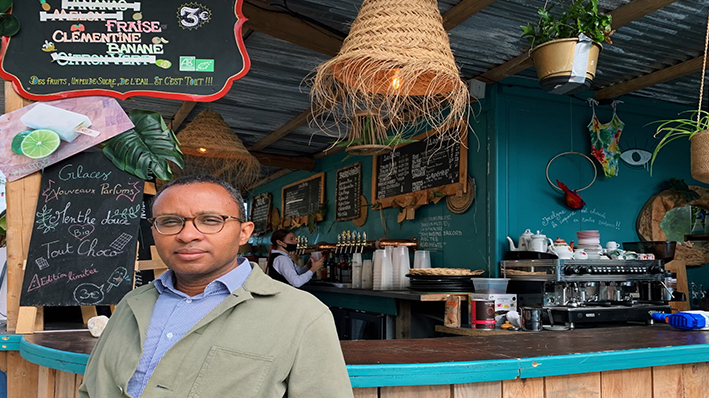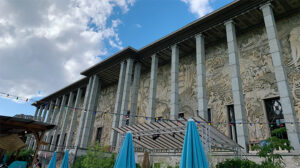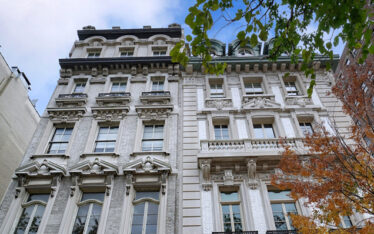
Courtesy of Caroline Levin
France, the country itself, increasingly looks different. With a non-white population taking up more visibility than a couple decades back, questions are being raised concerning what French identity means.
france at a crossroads…
With such pertinent demographic changes, France appears to be at a crossroads of definition and construction.
From the point of view of an outsider, hearing snippets from all ends of the political spectrum, the question of “what does it mean to be French in 2021” has never seemed so confusing. And yet, with the 2022 presidential elections well in sight, the need for a collective answer is as urgent as ever.
DIVERGING NARRATIVES
Given all this cultural backdrop, Le Palais de la Porte Dorée seemed the perfect setting to sit with Professor Pap Ndiaye, French historian and recently titled Director of the Palais, to continue discussing his thoughts on the diverging narratives dominating and dividing much of French society today.
Caroline Levin: The US has evidently had its “fascist moment” just as seen in a multitude of other Western countries witnessing powerful populist waves gaining much traction. But what has surprised me in my time in France is seeing how deeply the Left is divided regarding these issues of minority rights. It’s not merely a matter of alt-right being against anti-racism efforts.
Yes, the far Right is explicitly counter to the anti-racist fight across the boards, but say in the US, there’s not much disagreement on the left on these social issues— it’s focal to the political agenda… France doesn’t seem to be the same case.
Prof. Pap Ndiaye: Yes, the left is deeply divided on these issues, clearly, between one left which would be very traditional conservative attached to class as the only factor which explains inequalities in France, in a Marxist way.
You find many people on the left who believe what really matters is being poor or being rich— gender and race do not matter. If you are bourgeois, you are bourgeois, if you are poor, you are poor, period, refusing to acknowledge the multiple realities of inequalities and forms of domination.

Courtesy of Caroline Levin
That’s the traditional old-style French, which is very much resisting, very much attached also to the French idea of color-blind republicanism, which the French in general is very much attached to, let’s face it.
It’s a very powerful national myth. And, on the other hand, you have a “new left” so to speak, which is attached to analyzing and also putting forward the issues faced by minorities in France, whether sexual or racial minorities.
They consider that the left, in order to survive and thrive, needs to incorporate those issues into its political agenda instead of refusing it and sticking on the old left style of republicanism and Marxism as I said.
It’s a deep division, very powerful, sometimes very violent, which for now does not allow the left to think of getting back to power. So, the point is to figure out how to build bridges, find possibilities for those two lefts to speak to each other.
Some people say it’s impossible and I’m not so sure about that. I think it’s possible but it’s going to take time. We’ll see. But you’re right, it’s a very harsh battle going on these days with a very deep division.
options…
CL: The question of the left’s political agenda also seems to be really a generational matter— the “new” left being embodied by a very mobilized youth.
PN: It is a matter of generations as well. As you said, young French people are increasingly more aware, more “woke” as some would say, more attuned to gender issues as well as the Black Lives Matter movement and also the movement related to the environment and climate change.
Me Too, Black Lives Matter, climate change— these are the three issues around which the youth is politicized now. Moving from one generation to another, there is hope in many ways, but it’s going to take time.
So, what do we do now? Shall we say “OK, let’s wait. In 10 years, it’s going to be fine”. We should do things now, as much as we can.
But you’re right, we’re assisting to a massive change in the way politics is understood and the major issues, which the youth is mobilizing onto.
It’s less about classic forms of mobilization the way they existed 30 years ago around issues such as wages and purchase power for example than about issues related to climate change, the need to change our consumer habits for example.
All of this is very clear. But the youth don’t vote much as we saw last week. And the older you are, the more you vote.
So, the political influence of the youth, people your age, is quite weak in many ways compared to the seniors who tend to be conservative and who tend to not be interested in those issues.
CL: There is a significant crowd that might delegitimize the aspect “engagé” of your teaching, painting it as some “islamo-gauchisme” rhetoric. The comments can often be violent. Have you yourself faced much backlash from the public regarding the critical thought you actively vocalize?
PN: No, because in my case I feel well protected in many ways since I’m a full professor at Sciences Po, I have the proper degrees etc. in a country that respects degrees in a good school. So, that helps.
I also think my teaching in many ways remains classic. I’m very much attached to history as a discipline in a field. So, I wouldn’t call myself a “deconstructionist” because I remain straightforward.
As for “islamo-gauchisme” what can I say? Ludicrous. It cannot even begin to start to describe reality. It’s just way out there in terms of reactionary ideology… Absolutely ridiculous. I tend to look down at this, which is a way to protect myself also. I don’t want to waste my time with petty comments.
CL: I’m not sure if you saw the comment section of the Sciences Po Instagram page when they posted the English-speaking summer reading list. As it was primarily books pertaining to the BLM moment, so on race, white privilege etc. Many students put forth some comparatively violent comments condemning the suggestion of reading up on racial inequality. What would your response be to those comments?
PN: Look at this history that I was telling you about, this century long history, which is a French history and looks at the French empire and challenges the conventional understanding of French universalism.
Look at this history which is not an American import. It’s a French history. so, do you homework. That would be my answer.
CL: I was reading a book, Que’est qu’être français?, to get a standard gist of French universalist thought prior to this interview. In it, German-French writer Alfred Grosser writes “toute pensée en france est fondée sur une reference au passé”[1] (Translation: “all thought in France is founded on a reference to the past”). Do you think this is true?
PN: There is a good point here which is the importance of history in France. History is a serious matter. Every president has to write a history book or have someone write it.
So, yes, there’s this idea of a French master narrative, and I would argue a nostalgia in France for the good old days, when France was a superpower, and the French flag would float over all the continents. I think it’s also true in the UK I would say, the post-imperial melancholia.
CL: Do you think this perpetual attachment to the past in France is an effective way of moving forward giving the evolving society?
PN: Moving forward does not mean you do not have to look back. It’s how you interpret your own history. We’re facing a number of issues when reinterpreting our own history, opening or shedding light on dark corners of our own history. And we’re very busy with that.
CL: As I said, the book’s title is Que’est qu’être français? — what would be your response?
PN: There are many ways to be French. And any understanding of being French as a unique way or single understanding of it is at best a lie.
What we’re all acknowledging now is all the creative, multicultural ways in how Frenchness has changed over time and with which our understanding of Frenchness is multiple, depending on many things, such as on connections with foreign countries, with migrants.
We have to consider this multiplicity. Of course, we also have to think about what unites us. There are things which unite the French— just look at what happened when the French national team was defeated by Switzerland.
The city was quiet, people were mourning, in contrast with the French victory at the world cup in 2018 when everyone was out in the street. When the French won the world cup in 2018, you could tell that there was one country.
We have things in common and there is an attachment to France for sure. But, beyond that we also have to acknowledge the multiple realities of Frenchness and not be afraid of them.
CL: Do you think the future of French universalism can remain following this narrative of assimilation? Can this assimilation ever mean genuine integration?
PN: It’s hard to tell what will happen in the future. But what is true is that the critiques of assimilation were made by Césaire as early as 1935 when he said: “I’m studying Latin and Greek, but I also want to speak to my grandmother in Creole”, his native language from Martinique.
He said I do not want to change and be a “civilized” black as the French used to say— a “noir evolué” was the word at the time—, so someone who behaves as a white person, who distances him or herself from his origins because he is ashamed of his origins.
He said “no, I don’t want to be ashamed of myself and transform myself and mimic the French and run behind Frenchness like a little dog only to never get to the bone because you’re never French enough”.
He said, “I want to study Latin and Greek, yes, but I want to speak creole, and I want to be proud of myself and proud of my African roots and not hide them like a dirty secret”. So, it’s a long debate.
assimilate or integrate
And the idea of assimilation and the idea of getting rid of foreignness —whatever it means— is still very powerful in France especially among the most conservative people.
While at the same time, an idea of a more open and multicultural society is also getting around among the youth especially who also acknowledge that having ties with other languages, cultures, religions, is something that brings something to France.
That is exactly what we’re trying to do at this new exhibit at the museum of the History of Immigration: the beauty and the greatness of foreign cultures, how they have contributed to our own Frenchness.
cultural borrowing
CL: I have one last question, a bit more personal: What would your advice be for an outsider American fascinated with this current cultural climate in France? There’s a firm chance at being delegitimized with any critical thought I pronounce as, after all, I will never be able to properly understand what it means to be French.
PN: You all have legitimacy. Go forward. No questions to ask yourself— or only good questions. But no questions related to “am I legitimate enough”. No one is legitimate enough.
You have every right to do what you want to do, to read what you want to read, to discuss whatever you want to discuss. Don’t be afraid of it. There’s one condition: do it to your best. Not in a superficial way.
The debate on cultural appropriation, for example, is a debate on the superficiality of people just borrowing things from other cultures: for example, fashion purposes or whatever.
It shouldn’t be a debate for someone like you, who is truly and sincerely engaged. So, my only advice: do it.
[1] Bougrab, Jeannette, et al. Qu’est-Ce Qu’être Français?.: SUIVIES DE Entretien IMAGINAIRE Avec Montaigne / Par Roger-Pol Droit. Hermann, 2009.
Click Here For – PART 1
About the Article
Continuing a look at French identity today, current racial issues and diversified culture in both post–colonial France and the United States.



